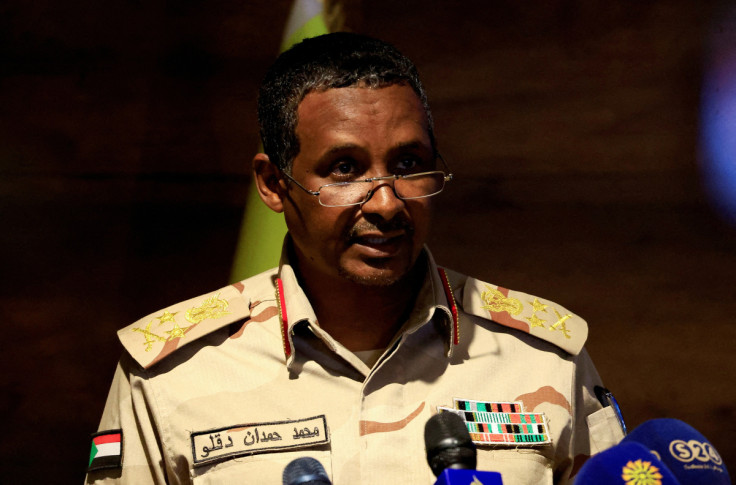Americans, Expats Hiring Private Security Firms To Flee 'Increasingly Dangerous' Sudan, Report Says
KEY POINTS
- It's becoming more and more dangerous to move around the country, officials said
- An official said it was 'imperative' for U.S. expats to arrange for their own safety
- USAID noted that Sudan was faced with shortages in food, water and power
U.S. nationals and other expatriates have been hiring private security companies for assistance in escaping from war-torn Sudan after the White House announced last week it cannot provide evacuation for Americans stuck in the country.
Dale Buckner, CEO of private security firm Global Guardian, told Wall Street Journal that the company's rescue teams "have to navigate dozens of checkpoints in an active war zone" to help get the stranded expats out of Sudan.
"We have hundreds of other clients waiting. But it's increasingly getting dangerous," Buckner said.
All U.S. government staff working at the embassy in Khartoum, as well as their dependents, have been evacuated, including a small group of diplomats from other countries, officials said Saturday. Fewer than 100 people have been flown out of the war zone, officials told journalists over the weekend.
The U.S. embassy in Khartoum issued a security notice on April 16, stating that "Americans should have no expectation of a US government-coordinated evacuation at this time."
John Bass, Undersecretary of State for Management, said the White House does not expect the security situation in Sudan to change in the near term. He added that the U.S. does not foresee coordination to evacuate American nationals in the coming days.
Vedant Patel, Principal Deputy spokesperson with the U.S. State Department, also said in a Friday press briefing that it was "imperative" for U.S. citizens still in Sudan to "make their own arrangements to stay safe in these difficult circumstances."
Patel reiterated the White House's August 2021 advice to Americans to not travel to the country.
"They're targeting transportation, infrastructure... even medical care is a target because it becomes a control lever for whoever comes out on top of this conflict."
— Julia Chatterley (@jchatterleyCNN) April 18, 2023
Dale Buckner, CEO of intl. security firm Global Guardian details the deteriorating conditions in #Sudan.
Part 1 pic.twitter.com/ja67OTSJeY
Buckner said Global Guardian staffers reported the presence of armed paramilitary at various checkpoints and downed bridges across the North African nation.
In an interview with CNN Thursday, Buckner said attempts for a ceasefire failed because "you have forces on both sides deployed across the country" and it was difficult to deliver the message of a truce "at the lowest level."
The U.S. embassy has since urged American nationals to "shelter in place until further notice." The notice was issued hours after the Sudanese military said it agreed to guarantee evacuation requests placed by China, the U.S., France and the UK, NBC reported.
Even after the Sudan military's statement, the U.S. embassy's alert noted that it wasn't safe yet to coordinate evacuation of private nationals. "The embassy is unable to assist convoys. Traveling in any convoy is at your own risk," the consulate added.
There are an estimated 16,000 American expats in Sudan, many being dual citizens, as per NBC. About 500 of them reportedly communicated with the U.S. embassy last week. As of Saturday, 55 American expats have requested evacuation.
Samantha Power, head of the U.S. Agency for International Development (USAID), said Sunday that civilians trapped in their residences had no access to medicines as the country continues to grapple with shortages of food, water and power, according to The Guardian.
Meanwhile, the White House is looking for options to get American expats out of Sudan, Reuters reported. Other countries including Britain, France, Germany, Italy, Egypt, Saudi Arabia Kuwait, Qatar, Russia and Sweden have either evacuated some of its citizens or are working to get their nationals out of Sudan.
The evacuations of some international diplomats Friday came after the third attempt at a ceasefire between the warring factions in Sudan collapsed. The World Health Organization (WHO) estimated that more than 400 people have been killed since the fighting started in mid-April and more than 3,500 have been injured. The actual death and injury tolls are believed to be much higher.
Fighting in Sudan started as a fierce power struggle broke through between the Sudanese armed forces loyal to the country's de facto ruler, Gen. Abdel Fattah al-Burhan, and the paramilitaries under the Rapid Support Forces (RSF) who follow former war leader Gen. Mohamed Hamdan "Hemedti" Dagalo.

© Copyright IBTimes 2024. All rights reserved.






















